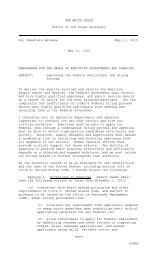Report - Government Executive
Report - Government Executive
Report - Government Executive
Create successful ePaper yourself
Turn your PDF publications into a flip-book with our unique Google optimized e-Paper software.
CHAPTER 6<br />
THE WAY FORWARD FOR DCIPS<br />
The DCIPS effort is designed to unify the DoD intelligence components under a single HR<br />
management system, further enhance the high quality of their workforce, and strengthen their<br />
ability to perform a vital mission. At the most fundamental level, however, it is about assisting<br />
in protecting U.S. national security interests. The importance of a robust personnel system to the<br />
ability of these organizations to defend the nation against terrorist attack, was highlighted by Lee<br />
Hamilton, former Congressman, Chairman of the House Permanent Select Committee on<br />
Intelligence and Vice Chairman of the 9/11 Commission, when he met with the Academy Panel<br />
to discuss DCIPS:<br />
[T]he necessity of defense against a terrorist attack is urgent. The threat is<br />
evolving, and there isn’t any doubt in my mind that they want to cause disruption<br />
and death. Therefore, I think there is an urgency. First, you have a lot of very<br />
good people working on the problem. However, my answer is that urgency is very<br />
important and that can only come from top leaders. Second, I am a real radical on<br />
personnel systems. You need to have the authority to hire and fire. I served on the<br />
Hart-Rudman Commission; the ability to hire and fire is a national security<br />
matter….Third, you need to have incentives to produce preeminent analysts. The<br />
best tool in terrorism is intelligence. You need to have good collection of data.<br />
We have unbelievable capabilities in collecting data. The problem is analyzing<br />
and managing that data. There are overwhelming amounts of data….When you<br />
think about civilian personnel, I hope you are thinking about the importance of the<br />
analyst in driving the actions and the direction of the agency.<br />
Because the intelligence mission is essential to the national security of the United States, the<br />
Panel agrees that DCIPS must be capable of attracting, retaining, and motivating the best people<br />
to contribute their best efforts. Based upon this review, the Panel understands the intended<br />
national security significance of DCIPS and believes the effort should proceed, but with<br />
conditions.<br />
The Panel applauds the effort that the USD(I) has made to bring the DoD intelligence<br />
components closer together through the adoption of DCIPS. However, it is critical that this<br />
effort to alter a fundamental element of the culture of those components be managed very<br />
carefully. The attention of the workforce cannot be diverted from the performance of its mission<br />
to the composition of its compensation.<br />
The Panel concludes that the design of DCIPS is fundamentally sound. Nonetheless, several<br />
major areas for further improvement are identified in this report. The implementation of the<br />
DCIPS design has been flawed for a number of reasons, and a significant number of<br />
recommendations for change and enhancement in that regard are also identified. Finally, it is too<br />
early to judge the actual impact of DCIPS, but the flaws in its implementation and the effects of<br />
105













